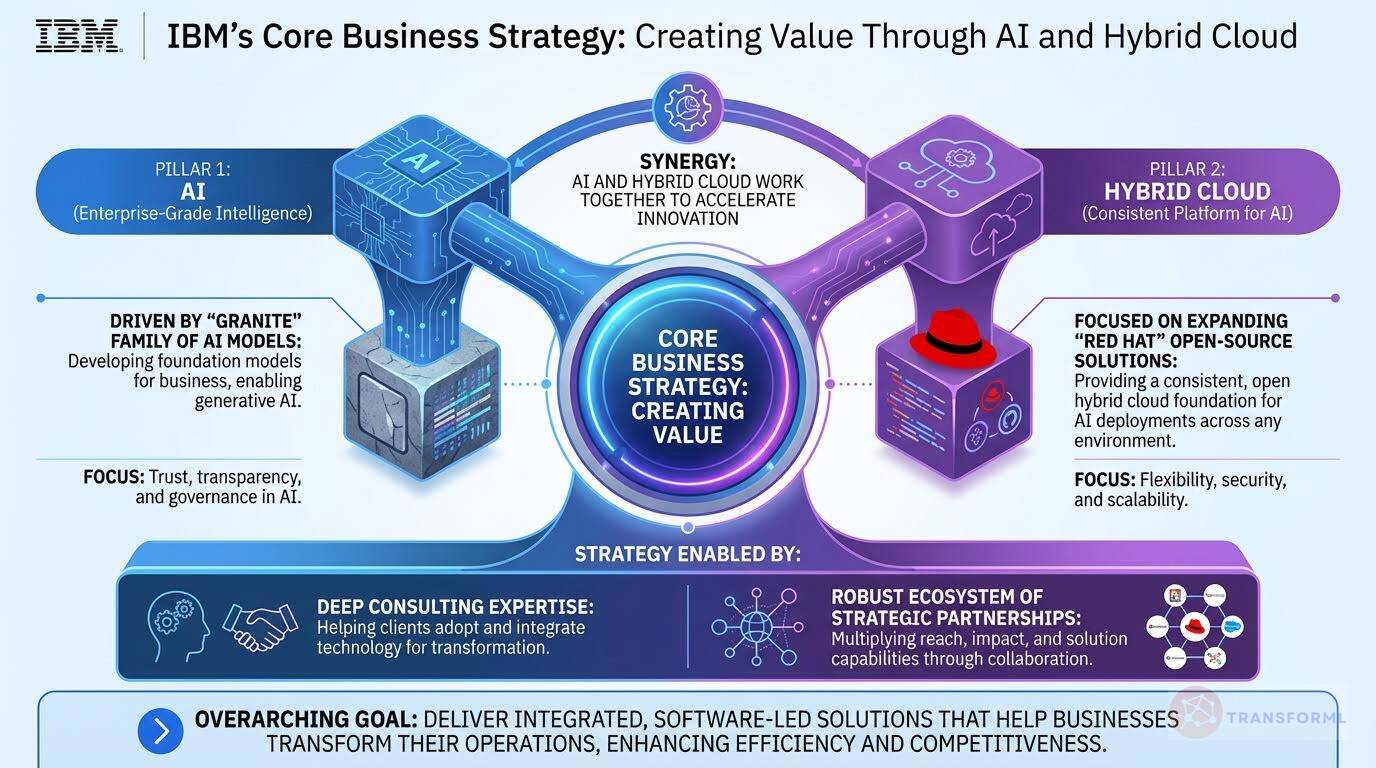International Business Machines Corporation Strategy Analysis

Editor-reviewed by Ahmad Zaidi based on analysis by TransforML's proprietary AI
CEO, TransforML Platforms Inc. | Former Partner, McKinsey & Company
Strategy overview for International Business Machines Corporation
IBM's 2024 strategy centers on becoming a higher growth, higher margin business by leveraging technology innovation and consulting expertise, with a focus on AI and hybrid cloud solutions. The company is investing in transforming its operations and reorienting its portfolio around AI-based solutions to drive growth and improve productivity. IBM aims to establish a leadership position in enterprise AI and hybrid cloud, delivering value to shareholders, clients, and partners.

Key Competitors for International Business Machines Corporation
AWS
Extensive cloud infrastructure and services
Microsoft
Strong enterprise software and cloud offerings
Salesforce
Leading CRM platform and cloud services
SAP
Dominant ERP software and business solutions
Oracle
Comprehensive database and cloud infrastructure
Insights from International Business Machines Corporation's strategy and competitive advantages
What Stands Out in International Business Machines Corporation strategy
IBM's most significant strategic distinction is the deep, symbiotic integration of its large-scale consulting arm with its technology portfolio, a model not replicated by its major competitors. While competitors like Microsoft and Amazon have professional services, IBM's strategy explicitly leverages 'IBM Consulting' as a primary engine for driving technology adoption, particularly in AI. This is evidenced by the fact that 'IBM Consulting fuels approximately 80% of IBM's AI bookings.' This 'How to Win' approach allows IBM to offer end-to-end transformation solutions, from strategy to implementation, using its own technology stack.
Furthermore, IBM's unwavering focus on 'Hybrid Cloud' as its central 'Where to Play' is more foundational to its identity than for its rivals. For competitors like Amazon (with AWS Outposts) and Microsoft (with Azure Arc), hybrid is an extension of their massive public cloud dominance. For IBM, hybrid cloud, powered by Red Hat, is the core platform, positioning it as a neutral integrator in complex, multi-cloud enterprise environments.
What are the challenges facing International Business Machines Corporation to achieve their strategy
IBM's primary challenge is competing on scale and growth in the core cloud and AI markets against hyperscale competitors. IBM's annual revenue of $62.8 billion and 3% growth rate are dwarfed by competitors like Microsoft ($245 billion revenue, 16% growth) and Alphabet ($307 billion revenue, 9% growth). Specifically in the cloud infrastructure space, IBM is up against the massive scale and momentum of AWS, which alone generated $108 billion in revenue, and Microsoft Azure, which grew 30%. This makes it difficult for IBM to compete on the raw price and breadth of services in the public cloud.
A second major challenge is in the battle for AI leadership perception. While IBM's watsonx and Granite models are enterprise-focused, Microsoft's partnership with OpenAI and Alphabet's development of Gemini have captured dominant global mindshare. IBM must fight to establish its brand as a leading innovator against the widely publicized and consumer-facing advancements of its rivals, which can influence enterprise buying decisions.
What Positions International Business Machines Corporation to win
Technology Innovation
- IBM has established an early leadership position in enterprise AI, building a portfolio of enterprise AI offerings focused on generating ROI through productivity improvements and automation. IBM watsonx provides a robust portfolio of AI products for developing AI apps, managing data, and governing the entire lifecycle of AI models.
Consulting Expertise
- IBM Consulting fuels approximately 80% of IBM's AI bookings. IBM is the only technology company with a consulting business at scale, which is a unique differentiator, especially when it comes to helping clients deploy AI. IBM Consulting Advantage enables deeper insights, faster time-to-value, and improved efficiency compared to traditional consultancy approaches.
Hybrid Cloud Platform
- More than 90% of Fortune 500 companies are using IBM's hybrid cloud products and solutions. IBM's AI and hybrid cloud platforms bring together the data, models, governance and monitoring capabilities needed to automate workflows and drive productivity.
Integrated Solutions
- Approximately 80% of IBM's revenue is generated by clients that buy across all three of its business segments (Software, Consulting, and Infrastructure). IBM is pioneering the model of a software-led, integrated enterprise that is driving value for its clients and growth for IBM.
Partner Ecosystem
- IBM has strengthened its strategic partnerships with key industry leaders like AWS, Microsoft, Salesforce, SAP, Palo Alto Networks, and Oracle. These partnerships serve IBM's clients better and create a multiplier effect for IBM.
Client Zero Philosophy
- IBM has adopted a "client zero" philosophy, meaning it benefits from the same technology solutions it offers to its clients. In particular, IBM has aggressively adopted AI-powered automation to drive productivity, delivering approximately $3.5 billion in productivity savings since the beginning of 2023.
Research and Development
- IBM Research continues to build and optimize computing architectures that allow enterprises to move and process data seamlessly between GPUs, CPUs, and QPUs, solving previously unsolvable problems for businesses and the world. IBM has deployed more than 70 quantum systems, with more than 250 organizations joining its IBM Quantum Network.
Financial Performance
- IBM has delivered 29 consecutive years of dividend increases. From 2022 through the end of 2024, IBM created greater than $100 billion in shareholder value and outperformed the S&P 500 by 58 points.
What's the winning aspiration for International Business Machines Corporation strategy
IBM aspires to be the catalyst that makes the world work better by creating technology and consulting solutions that enable businesses to scale, drive efficiencies, and fuel sustainable and profitable growth, particularly through hybrid multi-cloud and AI.
Company Vision Statement:
Company Vision Statement - IBM's mission to help businesses leverage technology to scale and grow profitably is more critical than ever.
Where International Business Machines Corporation Plays Strategically
IBM is focused on the hybrid cloud and AI markets, targeting enterprises across various industries and geographies. The company leverages its software, consulting, and infrastructure capabilities to provide integrated solutions that support clients' digital transformations.
Key Strategic Areas:
How International Business Machines Corporation tries to Win Strategically
IBM wins by offering a differentiated portfolio of technology and consulting capabilities, focusing on open, cost-efficient, hybrid, and domain expertise in AI. The company leverages its software, consulting, and infrastructure segments to deliver integrated solutions that address clients' most challenging business goals.
Key Competitive Advantages:
Strategy Cascade for International Business Machines Corporation
Below is a strategy cascade for International Business Machines Corporation's strategy that has been formed through an outside-in analysis of publicly available data. Scroll down below the graphic to click on the arrows to expand each strategic pillar and see more details:
Related industry articles:
AI and Hybrid Cloud: The Foundations of Value Creation
Focus on the two technological foundations of AI and hybrid cloud to unlock the full value of client data and deliver powerful, AI-based solutions.
Develop Granite Family of AI Models
Create and refine the Granite family of AI models, tuned with proprietary data, to deliver enterprise-grade generative AI with improved cost efficiency.
Expand Red Hat Hybrid Cloud Solutions
Enhance and promote Red Hat Enterprise Linux AI and OpenShift AI to provide clients with a consistent, open-source foundation for AI deployments.
Read more about industry strategies
Source and Disclaimer: This analysis is based on analysis of Annual reports for 2024. For informational purposes only (not investment, legal, or professional advice). Provided 'as is' without warranties. Trademarks and company names belong to their respective owners.
